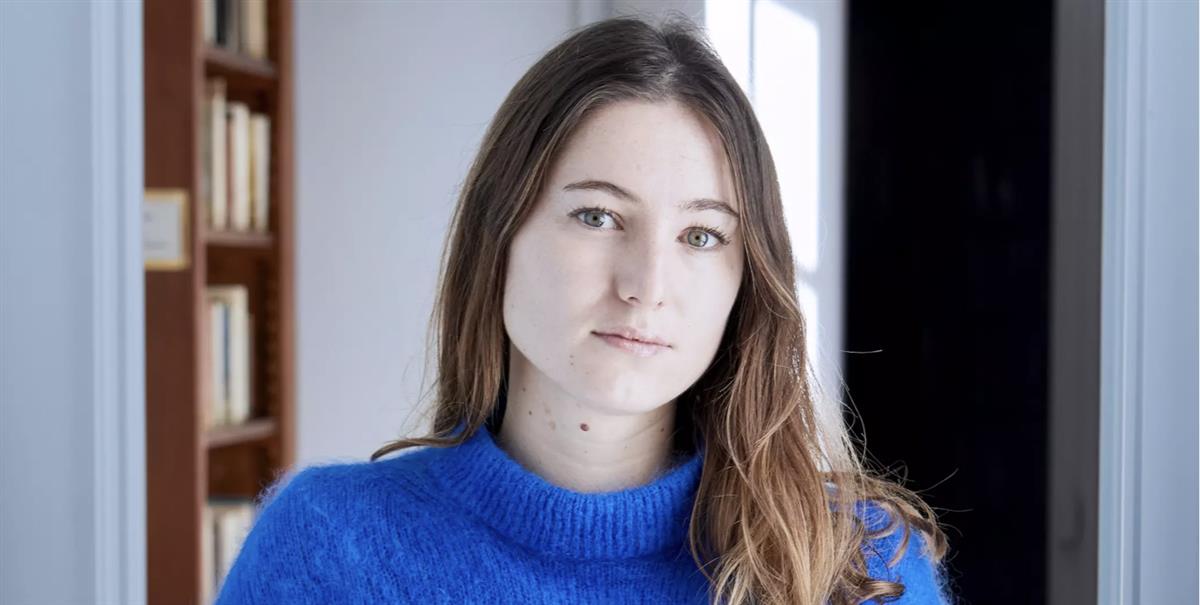
Camille Étienne at the Société de Lecture, 25 January 2024. (Société de Lecture/Magali Dougados)
SOURCE: GENEVA SOLUTIONS
CLIMATE & ENVIRONMENT Climate activism PORTRAIT
French climate activist Camille Étienne and the power of fear
By Michelle Langrand
From the Alpine glaciers to the deepest corners of the sea, Camille Étienne wants people to rise up and protect Earth’s most vulnerable ecosystems. Geneva Solutions spoke to the French climate campaigner in town for a talk at the Société de Lecture.
With her smartphone pressed to her ear, Camille Étienne paces around a tiny room in the centuries-old building in the old town of Geneva. Television network BFMTV is on the line to schedule an interview about the farmers’ protests that began to spread through France and other parts of Europe. Noticing she has company, Étienne glances over and sticks out her tongue in a sign of exhaustion.
The 25-year-old environmental activist, often referred to as the French Greta Thunberg, is in Geneva for the day to promote her book, Pour un soulèvement écologique (For an Environmental Uprising). She doesn’t usually agree to appear on the French right-leanning news broadcaster. “They talk nonsense,” she blurts out. But this time, the stakes are high: farmers struggling from inflation are revolting against environmental norms they fear will add to their economic distress.
For Étienne, countering the current French media narrative pitting her cause against theirs is crucial. She’s the first to recognise that “farmers are on the frontline of climate change”, but at the root of their hardship is a European agricultural policy that has favoured monocultures and encouraged industrial farming, she says.
This is just one of Étienne’s environmental causes. From camping in Europe’s biggest coal mine in Germany to taking her government to court for climate inaction, Étienne jumps from one battle to another without a moment of respite.
There is no time to waste, and as she says in her book published last year, there is no point in waiting for an epiphany – that sudden realisation that would mark the beginning of a life commitment. Her 165-page essay is written as an emotional, fact-based wake-up call. She picks apart the feeling of helplessness that has left many of us paralysed as the climate crisis unravels before our eyes.
“People everywhere around me were saying, ‘powerful people decide for us without us’. And we just go through life as if we were on a bus, looking at the landscape as it goes by, without being able to control anything,” she says.
Étienne argues that the myth of inertia can be explained. “Climate change scepticism didn’t just suddenly appear; it was invented by the fossil fuel industry,” just like people with vested interests are now peddling the narrative that a handful of experts and technological fixes will solve climate change.
Her book’s title is a call to stand up to those power structures. “The powerful do not have a real urge to act now because it will cost them their privileges. They won’t act unless there is some constraint.”
Fear as a catalyst
How do you awaken people from that sleeplike, apathetic state? In her publication, Étienne recounts one time ahead of a TV interview when the host told her she was like a softer version of Thunberg – as if in the “climate hysteria scale”, she was more acceptable for viewers, Étienne reflects. Another reporter from the crew asked her to talk about the state of the planet but not be too scary.
Étienne doesn’t understand the request: people should feel fear and outrage. She is part of a generation that has been told since birth that the end is coming. Witnessing the glaciers hovering over her childhood town, Peisey‐Nancroix, recede over her short lifetime has made that realisation hit close to home.
Étienne recognises the power of emotions as a catalyst: “We need to give emotions a place in the political sphere. We need to speak with people who feel this too and acknowledge that, yes, it is terrifying to live through the sixth mass extinction. Now that we said it, we can turn it into collective and concrete action.”
After experiencing a historic impetus with Fridays for Future, the climate movement appears nonetheless to have hit a slump more recently, eclipsed by other concerns, from Covid to the soaring costs of living.
Étienne is not worried. “It’s not because we don’t see as many people in the street that those people are not activists anymore,” she says. For the young activist, demonstrations are a great place to meet people, get educated and find motivation, before moving on to more organised action.
Shining a light on the less visible
Étienne has participated in all sorts of organised action but has never been to a UN climate Cop as she feels “it wouldn’t have changed anything”. Aware of the media attention that follows her, the activist prefers to focus on battles she feels are underreported. That led her to her latest cause – or “obsession”: preventing deep-sea mining in Norway. Earlier this month, it became the first country to authorise commercial exploration of the ocean’s floor for valuable minerals needed for the green transition.
Last year, she travelled to Kingston, Jamaica, to follow negotiations to regulate deep-sea mining. “I had the chance to be in the room and shine the light on what they were negotiating behind closed doors,” she comments.
“Deep-sea mining is one of those topics where it’s not real yet. We can, therefore, think of every possible action – taking them to court, using action on the ground, using (the arts) – to stop it before it’s too late,” she says. That’s my favourite part (of the fight): when we arrive on time.”
Climate activism
Youth
SOURCE: GENEVA SOLUTIONS